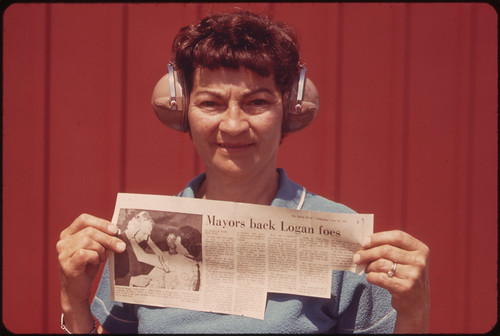The phrase ‘safe space’ in our time often refers to literal safety, comparable to the older aphorism, A man’s home is his castle, the belief that where we live should be free from all unwanted intrusion. It can refer to domestic violence shelters for battered women, protective orders for the victims of stalking, and child protective actions to keep predators of the young at bay.
But ‘safe space’ has also come to signify whether a group of people offer psychological and spiritual safety to each other . . . or not, as in whether it is ‘safe’ to offer another point of view within a particular context.
Like any good idea, the notion of safe space can become meaningless when it over reaches, as in the felt need to have no disagreement expressed with one’s own views, as disagreement is too often equated with threat or danger.
 |
| From Flickr Commons |
Disagreement can be healthy and can lead to new learnings, new ways of being, for all of us. If I listen, truly listen, to you, I can learn about a point of view I knew nothing of before. My point of view can bring the same eye-opening opportunity to you.
As someone with definite opinions (which means nothing more than that I know my own mind really well), I have often been accused, directly and indirectly, of threatening the safe space of others.
Usually, I am left puzzled after such conversations. What did I do or say that made the other person feel threatened? Is all disagreement threatening? Or is there something about the way I express myself, the certainty with which I speak, that leaves the other person feeling excluded or attacked?
Surely there is middle ground between the extremes of social and political discourse in our time of either (a) not discussing areas of disagreement at all (as in mother’s admonition to never discuss sex, religion or politics with others) or (b) name-calling, shouting vilification.
Which brings me right back to the question: how can I be a better safe space for those with whom I disagree the most?
I can speak more quietly. I can speak less and listen more. I can take off my ear muffs when it comes to the things I don't want to hear. I can try to do better.
But here’s what I’d like from you in return: please do not assume because we disagree, that I am bad or mean or not listening. I may hear you very well, but simply see things differently.
And let’s agree to this: when we post stuff on FB or in our blogs or anywhere into the technological ether, let’s pay attention, special attention, to truth. When I get it wrong, tell me. Insist that I retract the lies. And allow me to do the same with you.
Let’s be more gracious, especially to those with whom we disagree. They aren’t monsters.
I too have a concern that sometimes my strength is off putting to others...maybe that is one of my most vulnerable thoughts that turns into a midnight worry....i do not have any solutions and doubt i ever will....however i want to say that people who have strongly expressed ideas.are the ones who make me most comfortable....and offer a safe space for me to be myself...strength and all Ann
ReplyDeleteThanks Ann! from one strong woman to another :-)
DeleteLately, especially in political discourse, it is the norm to be rude, disrespectful, dismissive of facts and truth. I find it most disturbing to be forwarded lies that can be easily identified as such in my email.... Honest disagreement and discourse is actually an American value, the basis of the 2 party system and our legal system. If an opinion is held, doesn't it deserve truth as its basis? Forwarding lies and mis-truths tells me much about the person who created it and the person who forwarded it....
ReplyDeleteWell said, Twi.
Delete